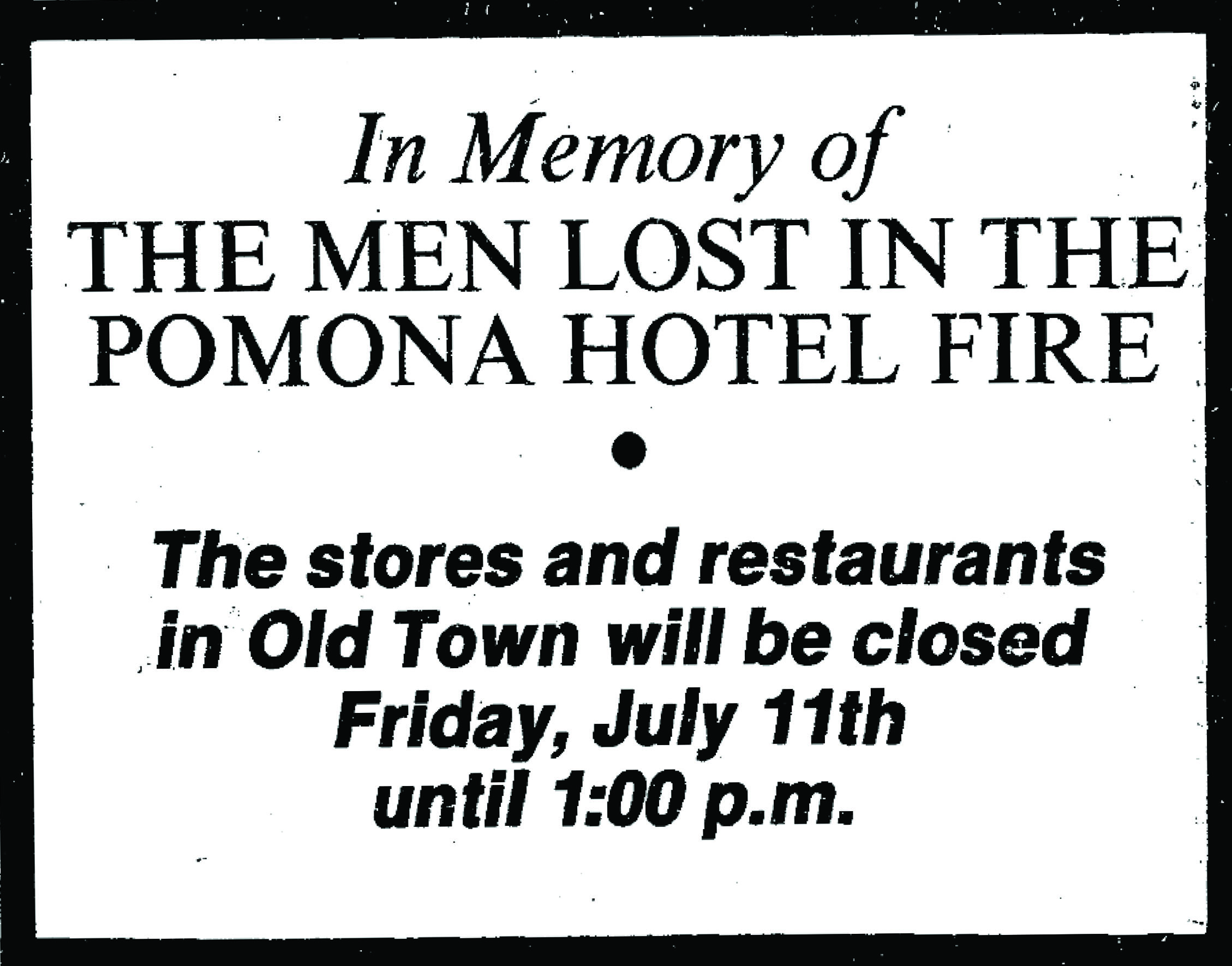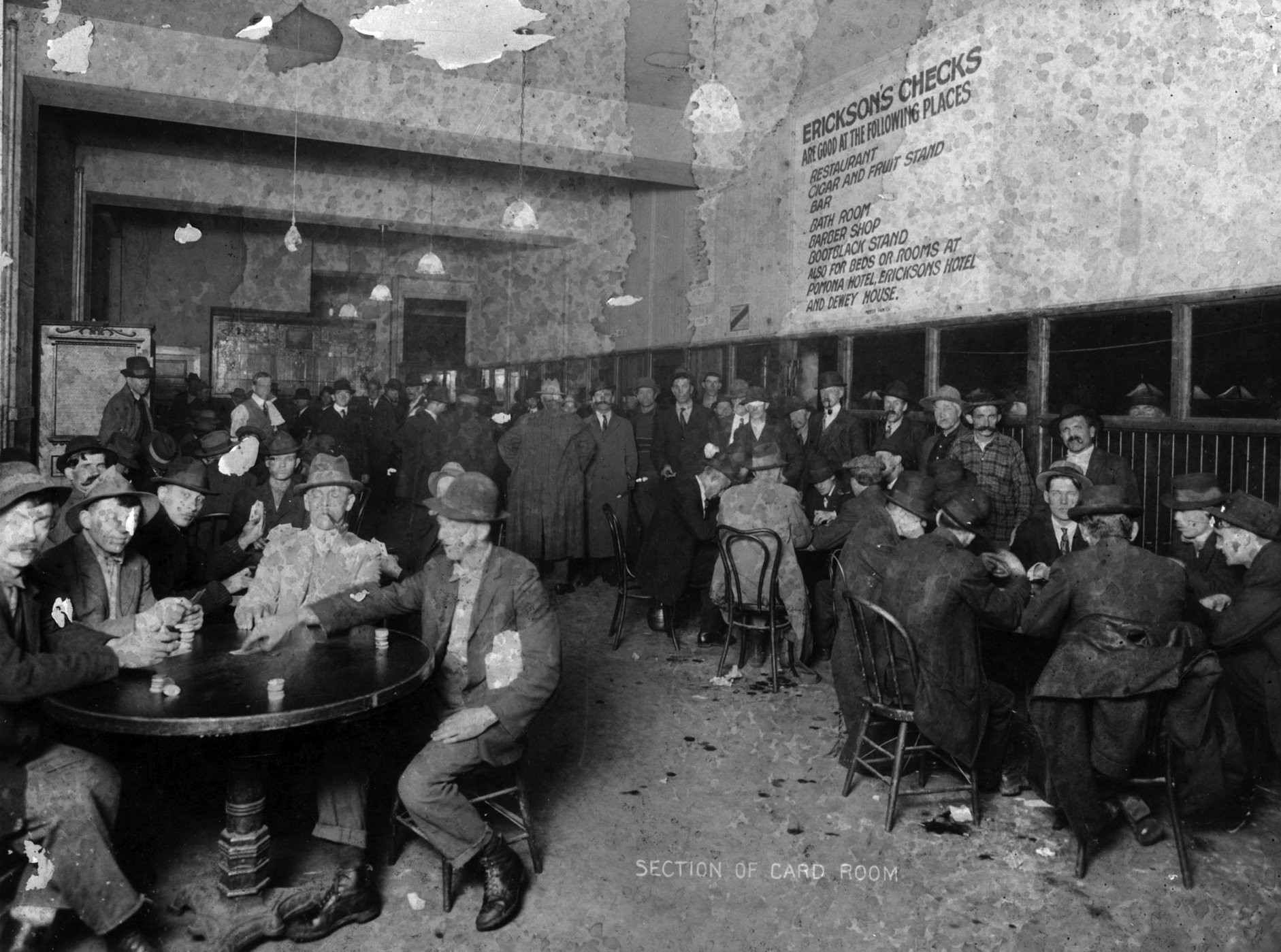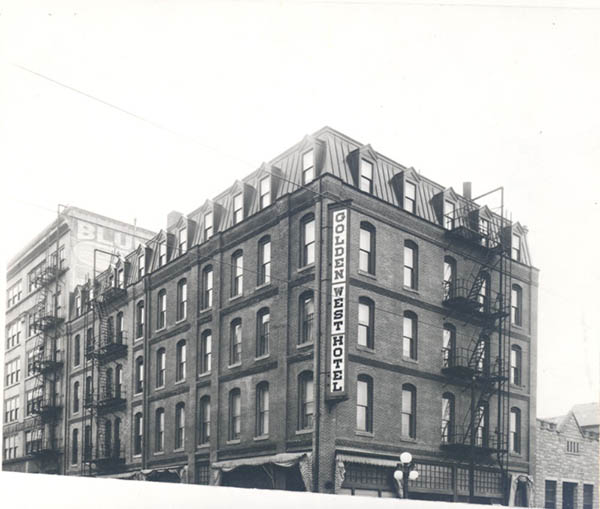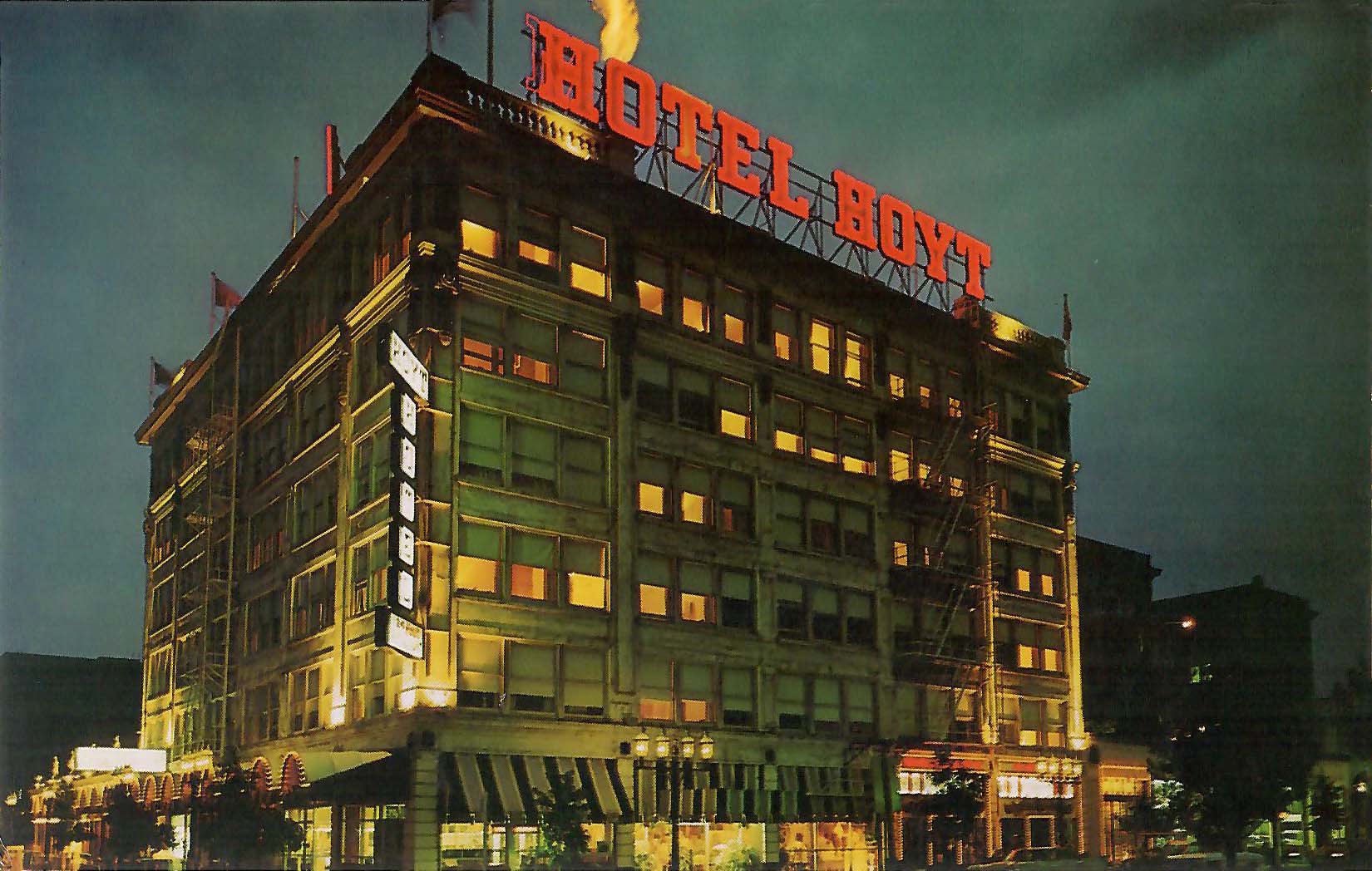On the evening of July 7, 1975, fire broke out at the Pomona Hotel, at 23 Northwest Second Avenue in Portland, killing twelve people in what was the deadliest fire from arson in Oregon history. Roy Jennings Beard remains the primary suspect for the crime, but he was never formally charged due to a judgment of mental illness. The fire spurred the adoption of updated fire safety codes and helped reveal the plight and neglect of the Old Town neighborhood.
The Pomona was a single-room occupancy hotel (SRO) in the upper floors of the block-sized building that had once housed the Erickson’s Saloon. In Erickson’s heyday, before Oregon instituted statewide Prohibition in 1915, the structure had been famous as the “longest bar in the world.” The third floor, the uppermost, had housed a series of cramped, roofless “cribs” intended for sex workers. Following Prohibition, the saloon was subdivided into spaces for smaller businesses, and the third floor became the Pomona Hotel, which was first advertised in the Oregonian on August 2, 1916.
By the 1970s, the Pomona Hotel was a neighborhood fixture. A tenant explained to the Oregon Journal the day after the fire that “it was one of the best places'' in the area, because “they give you clean sheets, they make up the bed, they mop, they do everything.” Developers Bill Naito and Sam Naito had purchased the building that February with plans to redevelop it, and Bill Naito told the Oregonian on July 9 that the lessee and manager of the hotel, Yukie Itoyama, “ran one of the best and cleanest Skid Road hotels on the West Coast.”
But on the night of July 7, at approximately 10:35, a man purchased fifty cents worth of gasoline from attendant Steven Robertson at the Chevron gasoline station across the street from the Pomona. As Robertson described him, he was “an old guy, maybe in his 70s and didn’t look like the kind of guy to own a car.” Not long after the exchange, someone poured gasoline into the stairwell of the hotel and set it on fire.
After a late dinner, Robert Harris, a forty-three-year-old contractor, noticed smoke coming from the windows of the “strangely subdued” hotel. He raised the alarm and hailed 911, a call recorded at 11:01 pm, and then put himself at personal risk to help rescue residents. Harris pulled down the fire escape ladder and shepherded residents to safety, entering the burning structure multiple times to help people escape the flames. He carried one severely injured woman to safety and assisted medical professionals with giving CPR to victims.
The fire’s location on the stairwell, together with the interior’s cluttered and haphazard layout, prevented easy egress. The lack of fire doors on the third floor was the primary cause of the casualties, as the heat from the stairwell was funneled into the third floor. Conditions became “so intense,” a fire inspector explained to the Oregonian, “that a deep breath after opening a door was sufficient to cause instant death.”
The need for better fire safety standards had long been noted in Portland SROs. Yet, the Portland City Council did not mandate fire doors be installed in all hotels until 1972, when it ordered compliance by April 1974. The date was extended an additional two years due to what the Oregonian characterized as a “moral dilemma,” quoting Doug Seely, an administrative assistant in the city’s Bureau of Buildings. The question, he said, was whether or not “you throw people out on the street to freeze to death or do you let them burn?” Senior Building Inspector David Beckman told the Oregon Journal that “the Pomona was inspected [before the fire], and found deficient, just as it had been the previous February and eight other times since the new codes began to be applied in May 1973.”
The two-year delay in implementing the fire-safety standards, according to Portland Fire Marshal Robert Buscho, meant that “up to 50 per cent” of fires during that period, including the one at the Pomona, could have been prevented with “far less loss of life.” Bill Naito maintained that he and his brother were unaware of any potential fire hazards in the five months they had owned the building. Due to the city council’s approved delay, the Naitos were fully in compliance with the existing codes, and charges were never filed against them.
The identity of the arsonist was never proven, but Robinson, the Chevron attendant, identified him as John Joseph Newvine. He was arrested the night of the fire but was released when the attendant later recanted. Then Roy Jennings Beard, a fifty-seven-year-old man with a criminal record for vagrancy and intoxication allegedly returned to the gas station to retrieve the deposit on the gas can. The attendant recognized him and alerted fire investigator Dante Petruzzelli. Beard was arrested—but was never formally charged—and remains the primary suspect.
In a July 12, 1975, statement to the Oregonian, Sgt. Tom Potter—who would be elected mayor of Portland thirty years later—claimed that police had additional witnesses and “substantially more evidence” linking Beard to the fire. Before he could be charged and the evidence presented, however, a court ruled that Beard was mentally incompetent due to a lifetime of alcohol abuse and his inability to understand the charges. He was committed to the Oregon State Hospital in August 1975. Three years later, the hospital declared Beard had “recovered sufficiently” to stand trial.
After being ordered to appear in court, Beard was returned to the hospital for a final competency ruling. That ruling was never made, and Beard remained at the Oregon State Hospital until April 1980, when he was released to institutionalized hospice care in his hometown of Lafayette, Indiana. He lived there for eight months and died on December 22. The only publicly known motive for the arson stems from fire investigator Petruzzelli, who said in 1982 that Beard “had thrown gasoline into the halls and lit it after a beef with a man who lived there.”
Eight people died during the fire, succumbing to smoke inhalation and burns, and more than twenty others suffered critical injuries. Over the six months after the fire, four more people died due to the injuries they received, bringing the total number of victims to twelve. The identified victims of the Pomona Fire were all men, with an average age of fifty-one. The only public commemoration of the Pomona fire was the closing of Old Town businesses for a half-day. Beard’s legal status was relegated to the back section of newspapers and then dropped entirely.
The Pomona was acquired from Bill Naito Corporation in 2013 by a nonprofit organization, Innovative Housing. By 2015, the property had been substantially refurbished and updated to provide sixty-two units of affordable housing. Despite the renovations, visible fire and smoke damage from the arson remains present throughout the structure.
-
![]()
"In Memory" announcement in the Oregonian, July 11, 1975.
Courtesy Portland Oregonian
-
![]()
Former Erickson's Saloon, now affordable housing..
Courtesy Department of Housing and Urban Development, Steven Vaughan, photographer
-
![]()
"8 killed in four-alarm hotel fire," Oregonian, July 8, 1975.
Courtesy Portland Oregonian
-
![]()
"Skid Road hotel fire toll highest in Portland's history," Oregonian, July 9, 1975.
Courtesy Portland Oregonian
-
![]()
Second Ave and West Burnside, 1976. Pomona Hotel can be seen at far right..
Oregon Historical Society Research Library, Oregon Journal,. bb12922, photo file 1620
Related Entries
-
![Erickson's Saloon]()
Erickson's Saloon
Erickson’s Saloon, sometimes called the Working Man’s Club or The Erick…
-
![Golden West Hotel]()
Golden West Hotel
The Golden West Hotel, located at Northwest Broadway and Everett Street…
-
![Hoyt Hotel]()
Hoyt Hotel
Opened in May 1912 to serve the traveling public and capitalize on Port…
-
![Portland Hotel]()
Portland Hotel
The Portland Hotel (originally called the Hotel Portland), a project in…
-
![William Sumio Naito (1925-1996)]()
William Sumio Naito (1925-1996)
William “Bill” Naito was born in Portland in 1925. His parents, Hide an…
Related Historical Records
Map This on the Oregon History WayFinder
The Oregon History Wayfinder is an interactive map that identifies significant places, people, and events in Oregon history.
Further Reading
Mancuso, Jo, and Jan Goetze. “8 killed in 4 alarm hotel fire.” Portland Oregonian, July 8, 1975, p.1.
Painter, John. “Floor of hotel where lives lost lacked fire doors.” Portland Oregonian, July 9, 1975, D1.
Pintiarich, Paul. “Man Gave Alarm, Saved Residents.” Portland Oregonian, July 9, 1975, p.D4.
Erickson, Steve. “Fire makes no sense to displaced hotel resident.” Portland Oregonian, July 10, 1975, B10.
Guernsey, John. “Residents helped survivors escape.” Portland Oregonian, July 9, 1975, D2.
Pintiarich, Paul. “Skid Road Man held as suspect in 8-fatality fire.” Portland Oregonian, July 9, 1975.
“Police accuse transient in nine hotel fire deaths.” Portland Oregonian, July 12, 1975.
“Hotel Fire defendant committed.” Portland Oregonian, August 20, 1975, B12.
“In Memoriam.” Portland Oregonian, July 11, 1975










